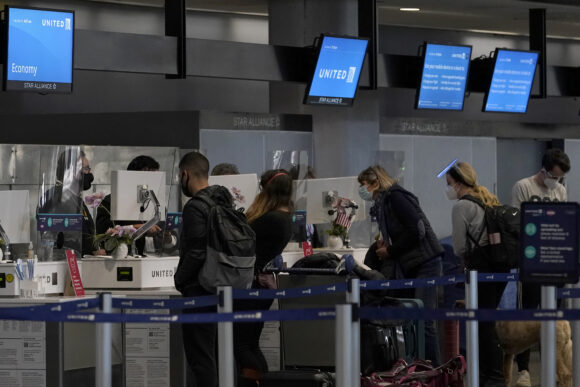DALLAS (AP) — The airline industry is escalating its campaign against a California law that gives pilots and flight attendants who are based there more rest and meal breaks than they are guaranteed under federal regulations.
A study commissioned by an airline trade group and released Tuesday warns that the result will be higher costs that would force carriers to cut flights and raise fares.
The trade group wants the U.S. Supreme Court to strike down a 2021 appeals court ruling which held that California-based flight crews are covered by the state’s requirement that workers be free from all job duties for 10 minutes every four hours and for a 30-minute meal break every five hours, even during flights.
The ruling by the 9th U.S. Circuit Court of Appeals in San Francisco came in a lawsuit filed by flight attendants for California-based Virgin America, which was bought by Alaska Airlines in 2016 and no longer exists.
The dispute boils down to a question of who gets to write labor regulations covering airline workers.
The Federal Aviation Administration sets safety standards for airlines, including minimum rest requirements for pilots and flight attendants to guard against fatigue that could lead to accidents. The industry argues that since deregulation in 1978, FAA’s authority has pre-empted states’ efforts to oversee airlines.
Airline officials are terrified by the prospect of facing a patchwork of state rules that they say would add complexity and cost to their operations. Officials of the trade group Airlines for America said this week that 19 other states have rules on employee breaks and could apply them to flight crews unless the Supreme Court overturns the ruling against Virgin America.
Lawyers for the flight attendants who sued Virgin America say the 1978 deregulation law gave the federal government sole authority over airline prices, routes and services but not other regulations affecting airlines. They say the appeals court ruled properly and there is no reason for the Supreme Court to review the matter.
Airlines already follow the California rest-break requirements for ground workers such as bag handlers and gate agents, according to the trade group officials.
The Biden administration’s solicitor general has not taken a position on whether the Supreme Court should hear the case. The airline trade group’s release of a report warning of dire consequences appears designed to put pressure on the administration to take the industry’s side before the high court.
The study by Canadian consulting firm InterVistas estimates that airlines would need additional pilots and flight attendants to comply with the California law. They might also make more frequent stops on flights using California-based flight crews. Depending on the approach, the changes would cost the industry between $3.5 billion and $8.5 billion a year, according to the consultant.
A more likely response — closing employee bases in California so that no airline flight crews are based there — would be much cheaper. However, that would require out-of-state flight attendants and pilots to commute to and from their flights, and it could introduce more uncertainty to staffing flights in Los Angeles, San Francisco and other California cities.
The nation’s largest union of flight attendants said crew rest was just one issue on which airlines are fighting against their employees.
“Management claims they couldn’t possibly keep up with state laws, but at every turn from Washington to California to New York and Illinois they’re working overtime to deny aviation workers adequate nutrition, rest, and sick leave,” said Sara Nelson, president of the Association of Flight Attendants.
Current FAA rules set a maximum work day of 14 hours for flight attendants, after which they need at least nine hours off before their next shift. The FAA has proposed adding an hour of rest between shifts without shortening the 14-hour duty period. Flight crews can take meal breaks, but — contrary to the California law — they must remain on duty.
The Supreme Court case is Virgin America Inc. v. Bernstein, 21-260.
About the photo: Travelers check in at United desks at San Francisco International Airport during the coronavirus outbreak in San Francisco, Tuesday, Nov. 24, 2020. The airline industry is raising the stakes in a fight over mandatory rest breaks under California law. A study commissioned by an airline trade group and released Tuesday, March 15, 2022, warns that unless the U.S. Supreme Court acts, travelers will face fewer flight options and higher fares.(AP Photo/Jeff Chiu)
Was this article valuable?
Here are more articles you may enjoy.


 Claims Handling Breakdowns From LA Wildfires One Year on
Claims Handling Breakdowns From LA Wildfires One Year on  Walmart to Pay $100 Million to Settle FTC Case on Driver Wages
Walmart to Pay $100 Million to Settle FTC Case on Driver Wages  Gas-Guzzler Revival Risks Dead-End Future for US Automakers
Gas-Guzzler Revival Risks Dead-End Future for US Automakers  AI Got Beat by Traditional Models in Forecasting NYC’s Blizzard
AI Got Beat by Traditional Models in Forecasting NYC’s Blizzard 